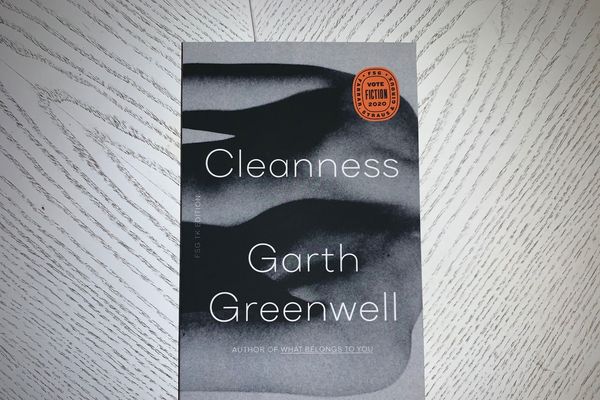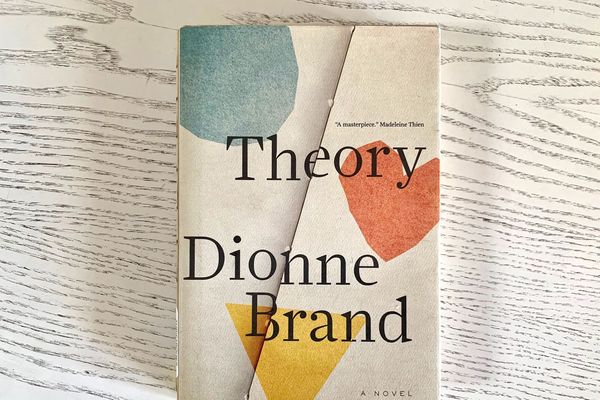
If you buy used books online you will inevitably receive copies that contain inscriptions, annotations, forgotten receipts, grocery lists, etc. Inscriptions are sort of sad because they suggest the recipient either died or disposed of the gifted book. Annotations I can ignore. Grocery lists are fun! But not until recently have I received a book that contained a postcard addressed (but not stamped or, obviously, sent) to an inmate at San Quentin State Prison. I had a flashback to years of playing team sports in middle school at a field with a direct view of that prison, which was built north of San Francisco in 1852 and overlooks the bay with a certain bleak grandeur. I Googled the book’s intended recipient to see what he was “in” for, which was vehicular manslaughter. It wasn’t a great book so the inmate didn’t miss much — although, also according to the internet, he’s now released and so perhaps found a way to read it anyway. Who knows. Maybe he liked it more than I did.
Cleanness by Garth Greenwell
Fiction, January 14
Reading sex scenes in literature is like watching competitive figure skating, in that both activities contain the potential to witness a person humiliate himself — either by using the word thrust or by biffing a lutz and falling butt-first on the ice. Greenwell’s book contains a ton of sex, but midway through, I was able to unclench my fear muscles as it became obvious that he wasn’t going to bungle anything. Hopefully this disclaimer means you can read it without any prefatory clenching. Cleanness is a kind of sequel to Greenwell’s first novel, or at least it has the same narrator, who is an American teacher in Bulgaria. It is a deconstructed love story set in a grayish post-communist city filled with bad wine and homophobia and stray dogs — not a romantic scenario for a romance, and yet!
In an interview about the book, Greenwell explained his risky sex-writing in quite beautiful terms: “I think literature is the best technology we have for representing consciousness, and so I think there’s a kind of intervention that literature can perform in representing sex explicitly: it can reclaim the sexual body as a site of consciousness.” If you do it well, then yes.
RIYL: Édouard Louis, Thomas Mann, vodka, Edmund White, Yorgos Lanthimos, demurring
Uncanny Valley by Anna Wiener
Memoir, January 14
Anna Wiener is 25 when her memoir opens, working as an assistant in publishing. She is broke but not poor — “privileged and downwardly mobile” is how she puts it. No student loans, some minor credit-card debt, still on her parents’ health insurance. “A person could live on thirty thousand dollars a year in New York; millions did more with less,” she notes. Still, she is lured to San Francisco to work for a data analytics start-up, where she makes more money and encounters an atmosphere of casual misogyny that smothers the office like an itchy sweater. When Wiener asks her mother for advice about working in a bro-centric universe, her mother replies: Don’t put any complaints about sexism in writing. On bad days she hides in the server room and reviews her bank balance. Two years in she quits and heads to a company that goes unnamed but is definitely supposed to be Github.
Wiener has the two talents that every memoirist needs: A devastating eye for detail (the CEO at an e-reading start-up misspells Hemingway’s name in his pitch deck, with two m’s) and the ability to map her experience onto a cultural shift much larger than herself. “I understood my blind faith in ambitious, aggressive, arrogant young men from America’s soft suburbs as a personal pathology, but it wasn’t personal at all,” she concludes. “It had become a global affliction.” Part of the book is about discovering that a woman with a nontechnical skill set is structurally exempt from any shot at respect within a tech company. Part of it is about the pathologies induced by the internet: the feeling of your mind being liquidated into a smoothie of other people’s thoughts and takes; the impotent jealousy and blunted rage inspired by infinite scrolling; the immovable conviction that everyone is more successful and firm-butted than you. I deadened my phone and laptop while reading this so I could give it my Undivided Attention. I’m recommending not only the book but also this reading method.
RIYL: Malcolm Harris’s Kids These Days, Mike Judge, wondering if you would be a good candidate for Soylent, Bay Area housing horror stories
Theory by Dionne Brand
Fiction, September 18, 2018
A reader described this as “like if Rachel Cusk was a Black Canadian Lesbian” — which, SOLD. And the novel is indeed Cusk-like in that it is a compact story that unspools through a series of relationships, and also in that it provides a lot of Thinking Material. But otherwise it doesn’t share much with Cusk or anyone else I’ve read. The narrator is an academic attempting to complete her dissertation. She (caveat: in interviews, Brand has referred to the narrator as a “she,” but no gender is specified in the book) is one of those individuals who fits into the “overtly unlikable but somehow lovable” category of human — a category that, while rough to experience in real life, really shines in fiction. The novel is about the narrator’s investigations of romance, work, family, and turning 40. The investigations are simultaneously sincere and woeful and impressive. I’ve never been gripped in genuine suspense by the question of whether or not an imaginary person will complete an imaginary dissertation — maybe you’ll join me in undergoing this novel (pun not intended and already regretted) experience.
RIYL: Academic satire, people-watching, indulging in a bitter mood, washing dishes angrily, Paul Beatty
WHY DON’T YOU…
Scarf this Flamin’ Hot CHEETO of a memoir if you missed it on the first go-round?
Visit a classic dispatch about community college? I attended community college (PROUDLY!) and had a statistics instructor who pronounced “minus” to rhyme with “penis” — a memory I fondly revisit when I read this piece.
Despair that Peter Schjeldahl — a writer so sublime he makes me feel like a FILTHY WORM just for trying — is on his way out? But doing it with such style …
Add vitamins and minerals to your MOVIE-VIEWING?
Test my contention that this piece about removing oneself from the grip of benzos is up there with “Being Alive” (Dean Jones version ONLY) as far as riveting expressions of HUMANITY?
Obtain PEAK CREEPINESS by listening to a pants-wettingly disturbing TRUE CRIME audiobook while going about your daily business with nobody else the wiser?
SUGGESTED PAIRING
Pair all the shitty holiday gifts you got with the gift you really deserve?
More From This Series
- Matrix and 9 Other Reads I Can’t Get Out of My Head
- The Listening House and 9 Other Reads I Can’t Get Out of My Head
- The Plot and 8 Other Reads I Can’t Get Out of My Head





